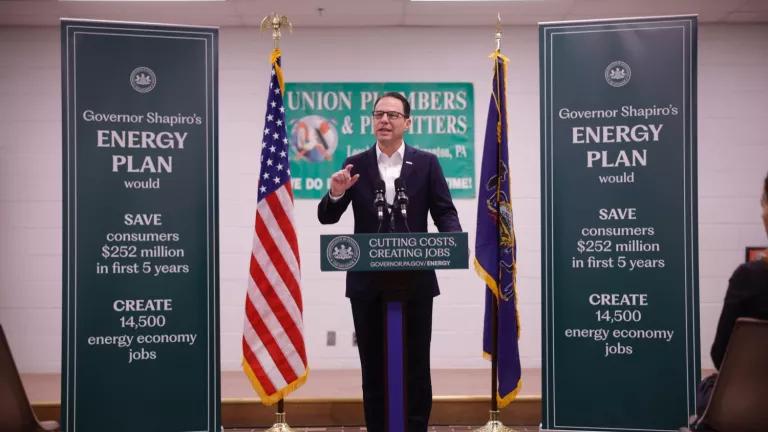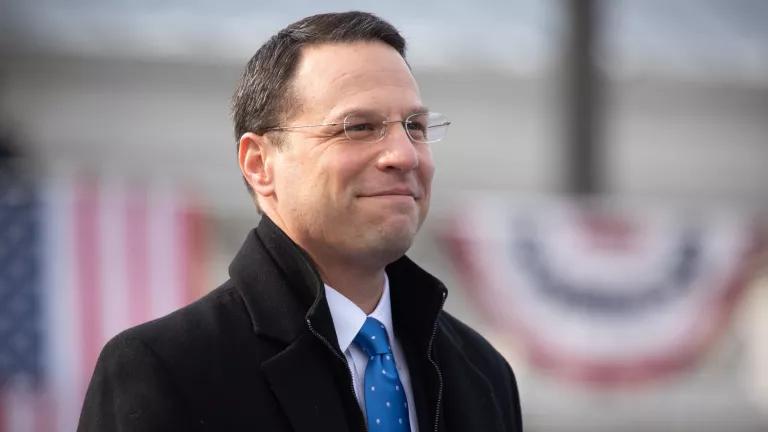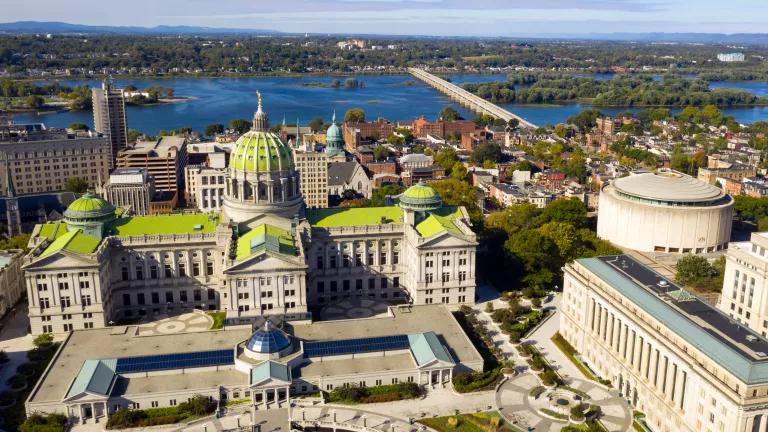The PA General Assembly Should Pass the RGGI Investments Act
As Pennsylvania draws nearer to participation in the Regional Greenhouse Gas Initiative, Pennsylvanians are increasingly interested in how the state will invest the proceeds it receives from the auction of RGGI allowances—likely hundreds of millions of dollars per year.

As Pennsylvania draws nearer to participation in the Regional Greenhouse Gas Initiative (see slide 31 of this DEP presentation for the current timeline), Pennsylvanians are increasingly interested in how the state will invest the proceeds it receives from the auction of RGGI allowances—likely hundreds of millions of dollars per year.
New legislation announced today by State Senator Carolyn Comitta and Representative Diane Herrin proposes an investment strategy based on concepts set forth by Governor Wolf in his 2021 budget address. The "RGGI Investments Act" is designed both to reduce air pollution and to build shared prosperity for the areas of Pennsylvania most in need of investment: environmental justice (EJ) communities and communities affected by impacts of the state's energy transitions, including the closure of coal-fired power plants. (Over the last decade, “energy transition” in Pennsylvania’s power sector has mostly mean a shift from coal to gas; looking ahead, it must mean a shift to non-emitting resources, especially efficiency and renewables).
This blog discusses the legislation (Senate Bill 15 in the Senate and House Bill 1565 in the House), explains why the General Assembly should pass it, and outlines what will happen if the General Assembly doesn’t pass RGGI spending legislation this session, as is likely.
Why Legislation?
Pennsylvania’s current pathway to RGGI is the Department of Environmental Protection’s proposed CO2 Budget Trading Program regulation, which the DEP is developing under an existing state statute, the Air Pollution Control Act (APCA). Although RGGI opponents claim that the APCA does not authorize the DEP to regulate carbon dioxide or participate in RGGI, the DEP’s legal authority is on quite solid ground. (For a full explanation, read this blog).
So Pennsylvania doesn’t need new legislation to participate in RGGI. But RGGI-specific legislation would be good to have for two reasons.
First, within hours after its promulgation, the DEP’s CO2 Budget Trading Program regulation will almost certainly be challenged in court, and while it should easily survive the challenges, they will consume a lot of time and attention that the DEP could better use in other ways. The uncertainty created by these challenges could also delay new public and private investment in Pennsylvania’s clean energy economy. RGGI legislation won’t prevent these lawsuits—but it would probably result in their being dismissed faster.
Second, as clearly as the APCA allows the DEP to regulate carbon pollution from power plants, it also clearly limits the ways the DEP can spend proceeds from the auction of RGGI allowances. Under the APCA in its current form, all auction proceeds will be deposited into the state Clean Air Fund, and the DEP will have to use them “for use in the elimination of air pollution.” That’s what we want the DEP to do, of course—and the air pollution elimination needs in Pennsylvania far exceed the amount of proceeds the state will receive under RGGI between 2022 and 2030.
But Pennsylvania also has urgent needs not directly related to eliminating air pollution. For example, coal-fired power plants are closing in Pennsylvania (mostly because of competition from cheaper gas-fired power plants) and RGGI proceeds could be used to help the affected communities recreate their economies—and meanwhile shore up the local tax base. (Power plants often contribute significant taxes to their host municipalities, so their retirement can leave a big hole for schools and local services).Environmental justice communities also desperately need investment, and some may prioritize the elimination of water pollution or establishment of a workforce training program over a particular clean air project.
What the RGGI Investments Act Would Do
The purpose of SB 15/HB 1565 is to authorize these kind of investments and ensure that 40 percent of all investments are made in environmental justice communities, defined as census block groups where minorities represent at least 30 percent of the population or 20 percent of the residents are at or below the Federal poverty level.
The legislation would do this by investing RGGI proceeds through three separate funds, as follows:
- 46 percent of proceeds would go to the DEP’s Clean Air Fund;
- 37.5 percent of RGGI proceeds would go to a new Energy Communities Trust Fund, established within the Department of the Treasury;
- 12.5 percent of proceeds would go to a new Environmental Justice Communities Trust Fund, also established at Treasury.
Up to four percent of the proceeds would be used by the DEP to administer the Clean Air Fund investments.
Just over half of the Clean Air Fund proceeds (56 percent) would go to a Greenhouse Gas Abatement, Energy Efficiency, Clean and Renewable Energy Investments Account to support projects that eliminate air pollution through energy efficiency, renewable energy, smart farming practices, and various other types of project; the other 44 percent would go to a Commercial and Industrial Energy Efficiency Account to support projects that eliminate air pollution in manufacturing and other commercial and industrial operations. Between the two accounts, one-third of all proceeds would be invested in EJ communities, with spending decisions made by the DEP.
The Energy Communities Trust Fund would fund projects to support workers and communities affected by the closure of fossil fuel-fired power plants and other energy facilities. Such projects could include workforce development programs, unemployment compensation for displaced energy workers, grants to school districts and municipal governments to replace tax losses, environmental clean-up projects, and general economic development projects. One-third of Energy Communities Trust Fund monies would be invested in EJ communities, with spending decisions made by a 15-member Energy Communities Trust Fund Board.
The Environmental Justice Communities Trust Fund would support a broad range of programs within EJ communities, including but not limited to environmental cleanup projects, recreation projects, and workforce development and worker training programs. All investments would be made in EJ communities, with spending decisions made by a 13-member EJ Communities Trust Fund Board.
Across the three funds, 40 percent of all RGGI proceeds would have to be spent in EJ communities.

Why the General Assembly Should Pass the RGGI Investments Act (and What Will Happen if it Doesn’t)
In the most recent RGGI auction, the price for CO2 allowances cleared at just under $8. Pennsylvania's starting RGGI budget will be 78 million tons, and while a few of those allowances will be "set aside" rather than auctioned, and while allowances prices fluctuate, all signs point to Pennsylvania's receiving several hundred million dollars in auction proceeds during its first year of RGGI participation. Between 2022 and 2030, SB 15/HB 1565 would likely invest more than a billion dollars in clean energy, workforce training, and support for workers and communities affected by changes in Pennsylvania’s energy sector, and direct 40 percent of this investment to environmental justice communities.
If the General Assembly were focused on the interests and needs of a majority of Pennsylvanians, SB 15/HB 1565 would pass easily—ideally with a few tweaks, like moving clean agricultural investments into the Clean Air Fund’s C&I account and including EJ community representatives on the Energy Community Trust Fund board.
Instead, both the House and the Senate are expected to pass anti-RGGI legislation (HB 637 and SB 119), after which Governor Wolf will veto whichever bill reaches his desk and the General Assembly will try and likely fail to override the veto. Then the whole drama will play out again under the state Regulatory Review Act’s legislative “disapproval” process.
Given these political dynamics, there is little expectation that SB 15 or HB 1565 will pass this session. Nor are there bright prospects for pro- and anti-RGGI legislators and Governor Wolf to agree on a compromise spending plan. In fact, despite Pennsylvania's great needs, Republican legislators want to delay spending plan much of the $10 billion that Pennsylvania received under the American Rescue Plan Act until after 2022 election, which they hope will deliver a Republican governor.
This means that the at least for the first few auctions, all of Pennsylvania’s RGGI proceeds will go into the Clean Air Fund—and that the General Assembly will likely try to expropriate much of it for other purposes. The DEP is preparing for the first part of this scenario by developing a Clean Air Fund investment framework, a draft of which we expect to be released for public comment this summer. The second part will be a political fight; NRDC and our allies will be ready.
As Senator Comitta noted at a press conference on the RGGI Investments Act this morning, the General Assembly has a duty under Article I, Section 27 of the Pennsylvania constitution to create a safe and healthy future for all generations. In recent years that duty has been honored mostly in the breach. There's no better opportunity for a change in direction than SB 15 and HB 1565.



